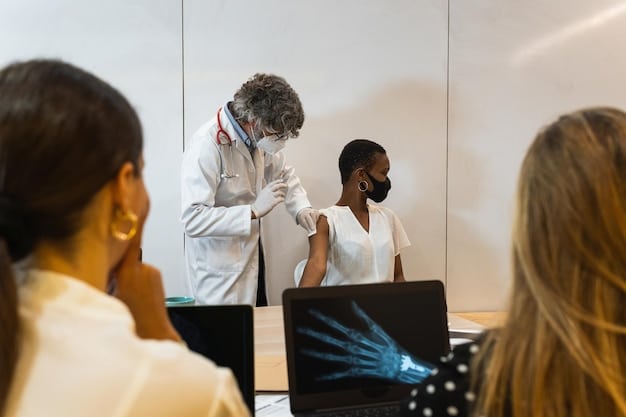US Biotech Events: NIH Funding Policy Impacts on 2025 Conferences

US Biotech Events in 2025 will significantly evolve due to the new NIH funding policies announced in December 2024, which emphasize data sharing, diversity, and rigor, impacting conference agendas and research priorities.
The landscape of US Biotech Events: How New NIH Funding Policies Announced in December 2024 Will Impact Conference Agendas is set for a dramatic shift. These funding changes aren’t just about the money; they’re about redefining research priorities and how scientific progress is communicated and shared within the biotech community.
Understanding the New NIH Funding Policies
The National Institutes of Health (NIH) has recently introduced new funding policies, impacting the entire US biotech research ecosystem. These aren’t simple adjustments; they fundamentally change the criteria and expectations for receiving federal research dollars.
Key Changes in NIH Funding Policies
The December 2024 announcement highlighted several key changes. These changes aren’t just bureaucratic updates but strategic shifts meant to boost research integrity, inclusivity, and data accessibility.
- Emphasis on Data Sharing: Greater emphasis on making research data publicly accessible for verification and further analysis.
- Diversity and Inclusion Mandates: Stricter requirements for promoting diversity and inclusion in research teams and participant demographics.
- Enhanced Rigor and Reproducibility: Requirements for designing experiments and reporting results that ensure greater reliability and validity.
These policy adjustments create a new framework for research planning and execution, impacting how researchers approach their work and how institutions allocate resources.
Impact on Research Institutions
Universities and research institutions are now adapting to meet these new demands. This requires not only the necessary adjustments to comply with the policies but also strategic planning to maintain competitiveness for NIH grants.

Institutions must allocate resources to training programs on data management and reproducibility, while also enhancing their outreach efforts to build more diverse research teams.
The changes create both challenges and opportunities. While adaptation requires resources and time, compliance positions institutions to lead in fields that prioritize these values.
How These Policies Redefine Conference Agendas
With the change of the NIH policies, the agendas for US Biotech Events will need to also adjust. Conferences are now a crucial platform for discussing and implementing said changes.
Spotlight on Data Sharing Protocols
Data sharing is no longer an optional add-on; it’s a core component of NIH-funded research. Conferences will play a vital role in educating researchers about the best practices and technologies for data sharing, emphasizing security, privacy, and accessibility.
- Workshops on FAIR Principles: Sessions focused on making data Findable, Accessible, Interoperable, and Reusable.
- Presentations on Data Repositories: Showcasing platforms and tools for secure and effective data storage and sharing.
- Discussions on Data Governance: Panels addressing the ethical and legal aspects of data sharing, including patient privacy and intellectual property.
Conferences will become spaces where researchers can learn to navigate the evolving landscape of data sharing requirements with guidance from leaders and experts in the field.
Diversity and Inclusion in Focus
NIH’s emphasis on diversity and inclusion will prompt conferences to prioritize representation and equity. This includes inviting diverse speakers, panel members, and attendees, as well as ensuring that conference content reflects diverse perspectives and experiences.
Conferences will actively seek out and invite speakers from under-represented groups, ensuring a variety of voices are amplified and heard.

Diversity and inclusion are essential to ensure that research benefits all segments of the population and reflects multiple approaches and perspectives.
The Role of Biotech Events in Promoting Rigor and Reproducibility
Rigor and reproducibility are not just scientific virtues; they are now essential components of NIH funding criteria. Biotech conferences serve as critical forums for promoting these principles throughout the research community.
Workshops on Experimental Design
Conferences will increasingly feature workshops focused on improving experimental design. These sessions teach participants how to minimize bias, control variables, and apply statistical methods to ensure robust and reliable results.
These efforts are aimed at improving the quality and reliability of biotech research, which is essential for translating findings into practical applications.
Best Practices in Reporting Research
Transparent and comprehensive reporting is just as important as rigorous experimental design. Conferences will help researchers learn how to document their methods, results, and limitations comprehensively so that others can understand and replicate their work.
- Guidelines for Data Documentation: Tutorials on creating thorough, comprehensible data sets and metadata.
- Strategies for Addressing Bias: Discussions on recognizing and mitigating potential sources of bias in research.
- Peer Review Simulations: Mock peer reviews of research papers to demonstrate the importance of clear and complete reporting.
Conferences contribute to creating a culture of transparency and accountability in biotech research, which is essential for building public trust and supporting scientific innovation.
Challenges and Opportunities for Event Organizers
The changing landscape presents both challenges and opportunities for organizers of US Biotech Events. Adapting to stricter NIH funding rules means a fundamental change in design and content planning.
Adapting to New Requirements
Event organizers must ensure that diversity, inclusion, and ethical data sharing are central themes. This requires a concerted effort to actively recruit diverse speakers and attendees, as well as integrating discussions on ethical data practices into the agenda.
Organizers need to establish clear guidelines and mechanisms for monitoring compliance with these principles to demonstrate their commitment to these values. This may require adjustments to the format, location, or price structure of future events.
Creating Value for Attendees
Those organizing US Biotech Events can increase their value by providing practical tools and resources that help attendees meet the new NIH demands. Beyond showcasing cutting-edge research, events can offer workshops, training sessions, and networking opportunities to promote data competency, diversity, and research rigor.
Furthermore, organizers can offer certification or accreditation programs to validate attendees’ knowledge and skills in these areas, enhancing the event’s professional development.
Preparing for the Future of Biotech Events
As NIH funding policies continue to evolve, US Biotech Events must stay agile and responsive. Actively preparing for future regulatory changes ensures that events remain relevant, valuable, and compliant.
Monitoring Policy Changes
Event organizers should establish mechanisms to stay informed about NIH policy changes. This includes establishing connections with NIH program officers, attending policy seminars, and following industry publications.
This proactive approach ensures that events respond quickly to evolving demands and maintain relevance for participants and guests.
Investing in New Technologies
To satisfy data sharing and collaboration criteria, organizers must invest in new technologies. This includes platforms for secure data storage, virtual collaboration tools, and interactive displays that permit remote involvement. These technological upgrades improve the event experience and encourage wider involvement and data sharing.
| Key Point | Brief Description |
|---|---|
| 🏛️ NIH Policy Changes | New funding rules emphasizing data sharing, diversity, and rigor. |
| 🤝 Biotech Events | Conferences adapting to promote new funding requirements. |
| 📊 Data Sharing | Events now focus on data accessibility for validation. |
| 🎯 Event Opportunities | Event organizers can provide tools to meet NIH demands. |
Frequently Asked Questions
▼
The key changes include more emphasis on data sharing, stricter diversity and inclusion mandates, and enhanced rigor and reproducibility standards in research. Data must be Findable, Accessible, Interoperable, and Reusable.
▼
Conference agendas will likely include more sessions on data sharing protocols, strategies for promoting diversity and inclusion, and workshops on enhancing research rigor and reproducibility to meet NIH requirements.
▼
Event organizers can proactively recruit diverse speakers, provide workshops on data sharing, invest in technologies to support remote participation, and establish connections with NIH program officers to stay informed of policy shifts.
▼
Data sharing promotes transparency, allows for validation of results, and facilitates further research and innovation by making data accessible to a wider scientific community, ensuring more reliable scientific studies.
▼
Diversity and inclusion will be promoted by actively inviting diverse speakers, ensuring diverse voices on panels, and including content that reflects various perspectives and experiences, enriching discussions and broadening viewpoints.
Conclusion
The updated NIH funding policies are poised to reshape US Biotech Events, emphasizing the importance of data sharing, inclusivity, and research rigor. Event organizers and participants must remain informed and proactive, adjusting their strategies to uphold the highest standards and contribute to biomedicine.





